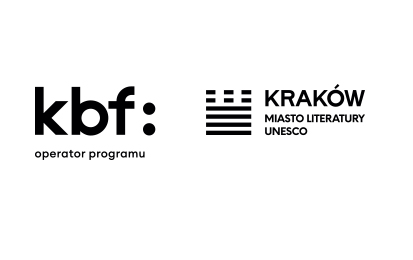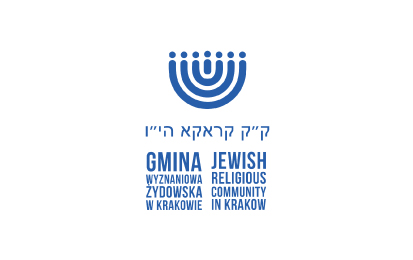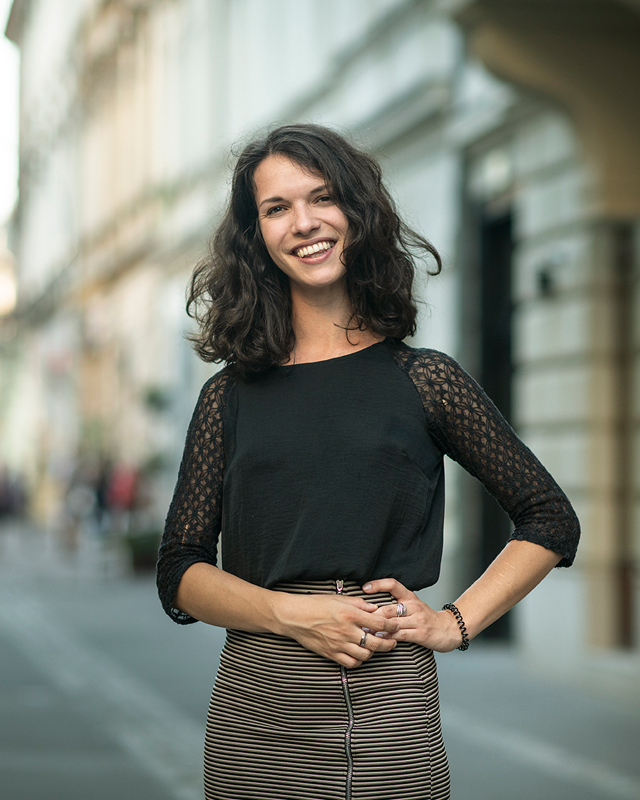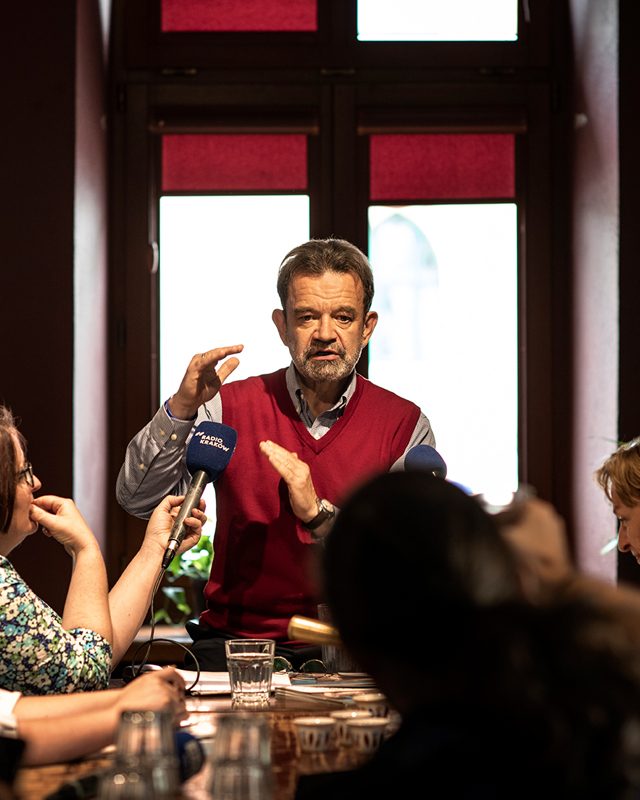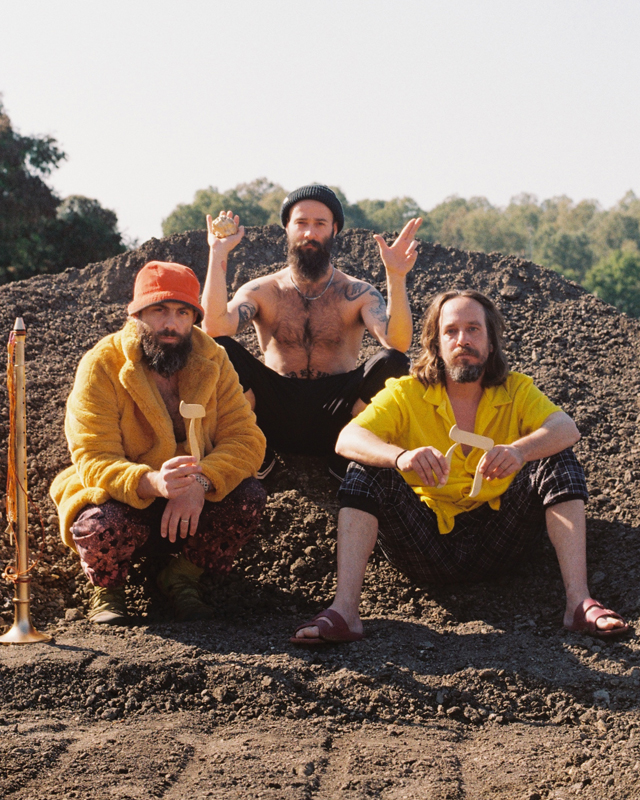LITERARY PROGRAM: New urban Legends (PL)
26.06.2022 - 16:00 / Tempel Synagogue, ul. MIiodowa 24, | Live: 31.jewishfestival.plNew city legends – a discussion featuring Łukasz Barys, Olga Drenda, Igor Jarek and Elżbieta Łapczyńska
Legends, or a must-read: where do they come from and why do we like them so much? What do they tell about us and how does contemporary literature process them? What city legends are associated with Krakow, Pabianice or Katowice?
An attempt to answer these questions will be a discussion featuring Elżbieta Łapczyńska – the author of Bestiariusz nowohucki [The Nowa Huta Bestiary] honoured with the Conrad Award, Łukasz Barys – the laureate of Polityka’s Passport in Literature for his prose debut Kości, które nosisz w kieszeni [The Bones You Carry In Your Pocket] and Igor Jarek – the author of Halny, a collection of short stories received enthusiastically by readers. The discussion will be hosted by Olga Drenda – a writer and an essayist, the author of Duchologia polska [Polish Spiritology].
‘Although Wacia could not put together even five correct sentences in Polish, she had great respect for literature. One day she told me a beautiful story she had read in the Valentine’s Day issue of Nowe Życie Pabianic. It was a story about a great writer Franz Kafka. He wrote only in German, although he was an Austrian, which means a Czech and a Jew. He wrote many interesting things, but from the beginning: Dora Diamant was born in Pabianice into the Diamant (Diamond) family – the Orthodox Jews who observed all commandments. … I did not believe Wacia, because I knew she was throwing me what she had in her saliva, and her saliva contains what will squeeze through holes in her brain,’ Łukasz Barys, Kości, które nosisz w kieszeni, Cyranka 2021
‘Everything ended when they discharged hot metal from the Big Furnace for the first time. It flew in an orange swirl into a tub, from which it was poured into a cupola oven and, after the addition of scrap, steel emerged. Steel was thrown into a rolling mill. This is where I ended and where I started. But that was later. Back then, it was the day of Great Discharge. What I have left of it, is life written on papers,’ Elżbieta Łapczyńska, Bestiariusz nowohucki, Biuro Literackie 2020
Łukasz Barys – a poet and writer, the author of the book Kości, które nosisz w kieszeni (Cyranka), for which he received Polityka’s Passport. He has published his works in literary magazines, such as Topos, Wizje or Nowy Napis, and has participated in many poetry contests, and the Institute of Literature published his poetry book Wysokie słońce [The High Sun] in 2020.
Igor Jarek – a writer, poet and former miner, coming from a family pursuing this profession for many generations. He never passed the graduation exam and has taken up various jobs in his life; he is the father of a child with disability. The winner of the Discovery of Empik award, nominated for Polityka’s Passports for the collection of short stories Halny, which ranked also among 10 best books of 2020. The author of poems (published in collections Różyczka and Białaczka), scenarios for comic books and a collection of short stories about Nowa Huta written from a perspective that has nothing in common with the cultural and tourist image of Krakow.
Elżbieta Łapczyńska – the author of the book Bestiariusz nowohucki [The Nowa Huta Bestiary] honoured with the Conrad Award and nominated for the Nike Literary Award, Polityka’s Passports, the Gdynia Literary Award and the Capital City of Warsaw Literary Award. The holder of a scholarship from the City of Krakow in the field of theatre, the laureate of the International Contest for Contemporary Drama on Jewish Topics, a semi-finalist of the Gdynia Drama Prize. She tried her hand in comic book, children’s literature and directing musical videos. A philosopher by education. She was born and lives in Krakow.
Olga Drenda – a writer, an essayist and a translator. A graduate of the Institute of Ethnology and Anthropology of Culture of the Jagiellonian University. The author of books: Duchologia polska. Rzeczy i ludzie w latach transformacji [Polish Spiritology. Things and People in Transformation Years], Wyroby. Pomysłowość wokół nas [Products. Inventiveness Around Us] (for which she was nominated for Polityka’s Passports and the Gdynia Literary Award in the Essay category) and interviews: Czyje jest nasze życie [To Whom Our Life Belongs] (together with Bartłomiej Dobroczyński) and Książka o miłości [A Book of Love] (together with Małgorzata Halber), as well as texts for anthologies Delfin w malinach [A Dolphin in Raspberries], Prognoza niepogody [A Bad Weather Forecast] and Hourras et désarrois. Scènes d’une guerre culturelle en Pologne. The author of essays accompanying the Spring Dreams exhibition (Biała Gallery, Lublin) and photographs by Łukasz Rusznica from the Subterranean River cycle. She ran a podcast on folklore ‘Ducholożka na tropie’ [A Spiritologist On The Trail]. Since 2013, she has run the Facebook.com/duchologia page devoted to sceptres of the era of transformation. Currently she is working on another book.






